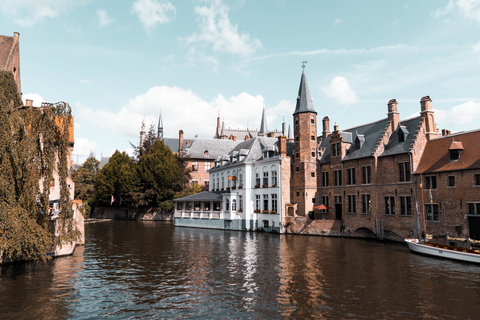Moving from
Ghent to Bruges

How It Works
Why choose us?
Experience is the key of success and that’s what our service providers have in abundance
5000+
50+


500+
home
improvements
Find help quick & easy!
Moovick is an all-in-one platform that provides clients with on-demand, professional Service Providers for moves and home renovation jobs in real-time for their day-to-day needs.
Car
Van
3.5T Trucks
7.5T (+) Trucks
Car (Taxi / Combo)
Perfect for small boxes, airport pick ups and luggage transfer.
Van (7-17 m3)
Great for moving studio or one bedroom apartments with basic furniture items and boxes.
3.5T Truck (20-24 m3)
Best for 1-2 bedroom apartments, small homes moves and commercials goods.
7.5T (+) Trucks
Best for 2 to 3 room apartments and upto 10 standard size pallets
Things to Know Before Moving from Ghent to Bruges
Switching cities is always a challenging decision. Regardless, you can embark on an enchanting journey by moving from Ghent to Bruges and immersing yourself in the mesmerising beauty of Belgium. With stunning medieval architecture, picturesque canals, and a rich history that dates back centuries, Bruges is a true gem waiting to be discovered.
Starting in Ghent, a vibrant city known for its beautiful landmarks such as the Gothic-style Saint Bavo's Cathedral and the Castle of the Counts, you'll feel like you've stepped back in time. As you go to Bruges, a UNESCO World Heritage Site, prepare to be charmed by its fairytale-like atmosphere. Explore the cobbled streets lined with colourful houses, visit the iconic Belfry Tower, and enjoy the delicious Belgian chocolates.
As you journey through the cities, you'll understand why moving from Ghent to Bruges is necessary for anyone seeking a genuinely enchanting European experience.

FAQs
When moving from Ghent to Bruges, it's essential to consider the key factors to ensure a smooth transition.
Weather
One of the first things to think about is the weather in Bruges. The city experiences a temperate maritime climate with mild summers and cool winters. Be prepared for moderate rainfall throughout the year, so investing in a good raincoat and umbrella is advisable. The weather in Bruges can be unpredictable, so layering your clothing is a wise choice to stay comfortable in changing conditions.
Language
Another crucial aspect to consider when moving to Bruges is the language spoken in the region. The official languages in Belgium are Dutch, French, and German, with Dutch being the predominant language in Bruges. While many people in Bruges speak English, especially in tourist areas, learning a few basic Dutch phrases can go a long way in helping you navigate daily life and connect with the local community. Consider taking a language course or using language-learning apps to familiarise yourself with Dutch before your move.
Here are critical differences between Ghent and Bruges that you should take note of:
- Lifestyle
- Historical Background and Cultural Heritage
- Geographical Features and Landscape
- Food and Culture
- Size and Cost of Living
- Tourism
- Transportation
Lifestyle
One of the significant differences you may notice when moving to Bruges is the slower pace of life compared to larger cities. Bruges is known for its relaxed and laid-back atmosphere, making it an ideal destination for those seeking a peaceful and tranquil environment. Embrace the leisurely lifestyle by taking leisurely walks along the canals, enjoying a coffee at a cosy café, or simply soaking in the charm of the historic city centre. Adjusting to the slower pace may take some time, but it offers a unique opportunity to unwind and appreciate the beauty of everyday moments.
Historical Background and Cultural Heritage
In terms of historical background and cultural heritage, Ghent and Brugea each have a rich tapestry of stories that have shaped their identities over the centuries. Ghent boasts a history steeped in the Industrial Revolution and technological advancements, with museums and historical sites showcasing its journey from a humble town to a bustling metropolis. On the other hand, Bruges takes pride in its ancient roots, with preserved monuments and traditions that reflect a bygone era of kings and conquerors.
Geographical Features and Landscape
Before moving from Ghent to Bruges, you should know that the geographical features and landscapes offer contrasting backdrops that contribute to their unique appeal. With its skyline dominated by towering skyscrapers and bustling streets, Ghent presents a picture of urban dynamism against a backdrop of modernity. The city's waterfront areas and parks provide green oases amidst the concrete jungle, offering residents and visitors a respite from the hustle and bustle of city life.
In contrast, Bruges is characterised by its quaint cobbled streets, historic architecture, and lush green spaces that exude a sense of tranquillity and charm. The city's proximity to natural landscapes such as mountains, rivers, or coastline adds to its scenic beauty, inviting outdoor enthusiasts to explore the surrounding areas and soak in the peaceful ambience. Whether strolling along the riverbanks of Ghent, wandering through the historic districts, or just moving from Ghent to Bruges, visitors are treated to a visual feast of contrasting landscapes that reflect the diversity.
Food and Culture
Before the move from Ghent to Bruges, you should be aware that Ghent offers a wider variety for adventurous eaters, including innovative cuisine and vegetarian options. At the same time, Bruges excels in classic Belgian favourites. Ghent boasts a youthful energy with a thriving art scene and nightlife, while Bruges offers a more timeless, fairytale-like atmosphere.
Size and Cost of Living
Ghent is a larger city than Bruges, with a population of around 260,000 compared to Bruges' 118,000. Ghent generally has a broader variety of shops, restaurants, and nightlife options. However, living in is also more expensive, with higher housing costs and a faster pace of life.
Tourism
Bruges is one of Belgium's most popular tourist destinations, while Ghent is less crowded. Bruges will have more tourist amenities, such as souvenir shops and restaurants with English menus. However, it can also feel more crowded and commercial.
Transportation
Ghent and Bruges have sound public transportation systems, but Ghent's is more extensive. Ghent is also located on a central canal, meaning you can take boat tours or cruises. Bruges is more walkable, and there are many canals in the city centre that you can explore on foot.
The cost of living in Bruges is generally lower than in major cities like Brussels or Antwerp. Rent prices vary depending on the neighbourhood, with the city centre being more expensive than the outskirts. Groceries and dining out are reasonably priced, making enjoying the local cuisine and fresh produce affordable. Overall, Bruges offers a comfortable standard of living at a reasonable cost.
Bruges is considered a safe city with lower crime rates than other European cities. The well-preserved medieval architecture and the city's compact size make it easy to navigate on foot or by bike, enhancing the overall safety of the area. Like any city, taking standard precautions such as being aware of your surroundings and securing your belongings is essential, but residents generally feel safe in Bruges.
Bruges is a walkable city, with many attractions located within a short distance of each other. Public transportation in Bruges includes buses and taxis, providing convenient options for getting around the city and its outskirts. Cycling is also popular in Bruges, with bike rentals allowing residents and visitors to explore the city at their own pace. Additionally, Bruges is well-connected to other Belgian cities by train, making it easy to travel.
Bruges has a well-developed healthcare system, with hospitals, clinics, and medical centres offering a range of services to residents. The city has several hospitals with modern facilities and qualified medical professionals. Depending on their needs and preferences, expats moving to Bruges can access healthcare services through public or private health insurance.
Bruges is charming year-round, but the best time to visit depends on your preferences. The summer months from June to August are popular for tourists, with pleasant weather and a vibrant atmosphere. However, staying in the shoulder seasons of spring and autumn can offer milder temperatures and fewer crowds, allowing you to enjoy the city's beauty in a more relaxed setting. Winter in Bruges brings festive markets and holiday decorations, making it a magical time to experience the city's winter wonderland.
Getting the necessary information before moving will be a big boost. Securing the perfect city and international mover with Moovick will make your move happy ever after. Connect with real-time professional service providers and handymen on Moovick for various moving-in services from the comfort of your couch!



